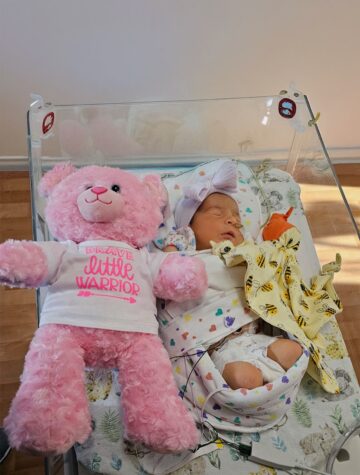For expectant families who receive a diagnosis like a birth defect, syndrome or medical condition for their baby, pregnancy can be confusing and scary. They may not know what the next step to take is; who to receive care from; or how to process the news.
Amy Cuevas, nurse coordinator at the Fetal Care Center of Southern California, a partnership between CHOC and UCI, offers six practical steps for families to take if their baby receives a fetal diagnosis.
1. Ask for referrals right away.
If your OB-GYN recognizes something unusual during ultrasound or anatomy scan, they may be able to diagnose your baby’s birth defect or medical condition immediately, or they may want to seek a second opinion for a full diagnosis. Either way, your OB-GYN should make you a referral to see a specialist or multiple specialists.
The Fetal Care Center of Southern California offers specialists in maternal-fetal medicine, neonatology, pediatric general and thoracic surgery, cardiology and cardiothoracic surgery, neurosurgery and neurology, urology, ENT, genetics, orthopedic surgery, plastic surgery and more — with all appointments taking place in one centralized location at CHOC. You’ll also have a nurse coordinator, like Amy, who is with you every step of the way.
2. Understand that fetal diagnoses are common.
An unexpected diagnosis can be disappointing, emotional and hard to process. Some parents ask what they did wrong or how they can fix the diagnosis, says Amy. But your baby’s diagnosis isn’t your fault. Syndromes and birth defects can develop randomly or because of genetics. Unfortunately, there isn’t a way to reverse or “fix” your baby’s diagnosis.
Accepting that you can’t change your baby’s diagnosis is part of the process, Amy says. Your care team will do everything they can to help you and your baby stay safe and healthy.
Try to relax during this time, even though it may be hard. Fuel your body with nutritious food, go on walks and do activities you enjoy like hobbies, watching fun movies and spending time with family and friends.
3. Get emotional help.
On top of processing their baby’s diagnosis, some parents may have additional worries during this time: taking off work for appointments; trying to care for other children at home; or receiving extra monitoring. Don’t hold that all inside, Amy says.
If you’re feeling stressed and overwhelmed, reach out for help. Your care team, family and friends are there for you. Seek professional help for additional psychological support, if needed. Your care team can refer you to counseling and community resources.
4. Ask your doctor questions.
It’s easy to get confused with all the medical terminology surrounding a diagnosis. Throughout your care journey, don’t be afraid to ask a lot of questions, says Amy. Your providers are there to walk you through the process from diagnosis to delivery.
Keep a notepad with you to jot down questions both at appointments and between appointments – that way you won’t forget if there was something you wanted to ask. Reach out to your nurse coordinator at any time who can help to connect you to your care team when needed.
“I want my patients to call me for anything they need, I can always help. I even have patients call me when they go into labor!” Says Amy.
5. Mentally prepare your family.
It’s important to discuss the diagnosis with other siblings and the rest of the family. Kids can often understand more than you might think, so you may want to explain your baby’s diagnosis. Reach out to your care team for additional support — some healthcare systems offer child life resources like The Cherese Mari Laulhere Child Life Department at CHOC. Child life departments have professionally trained individuals who can explain diagnoses to older siblings while offering support to the entire family throughout your pregnancy.
But it’s also important for parents to lean on their friends and families. All patients at the Fetal Care Center of Southern California are advised to bring a support person, if possible, to their appointments. You can’t do this all on your own — your care team and community are rallying behind you.
6. Be flexible with your delivery plan.
The best plan for delivery is to be flexible. Together with your team, develop a delivery plan that is safe for both mom and baby, says Amy.
For high-risk births, performing delivery at home with a midwife will not be possible — some parents may have to give up that part of their plan. As you develop a safe delivery plan, keep in mind that even that plan may have to change. Trust your providers—they will do whatever it takes to keep both you and your baby safe.
Get more expert health advice delivered to your inbox monthly by subscribing to the KidsHealth newsletter here.
Learn more about the Fetal Care Center of Southern California
As a partnership between UCI Health and CHOC, The Fetal Care Center of Southern California brings together experts in maternal-fetal medicine and pediatrics, so both mom and baby are cared for—no matter the diagnosis.





